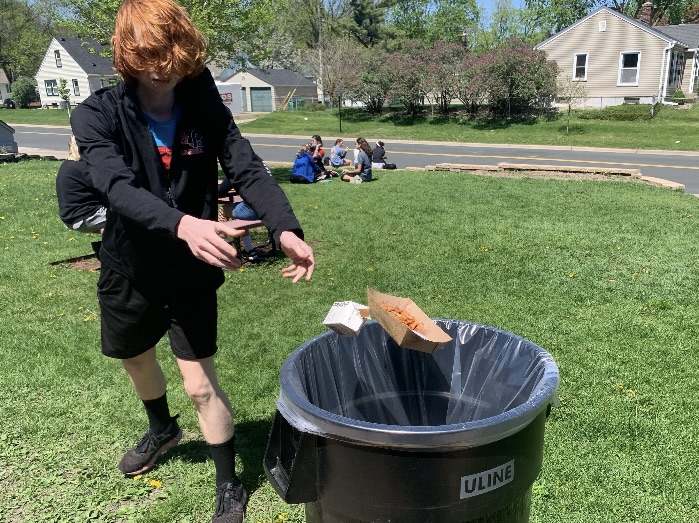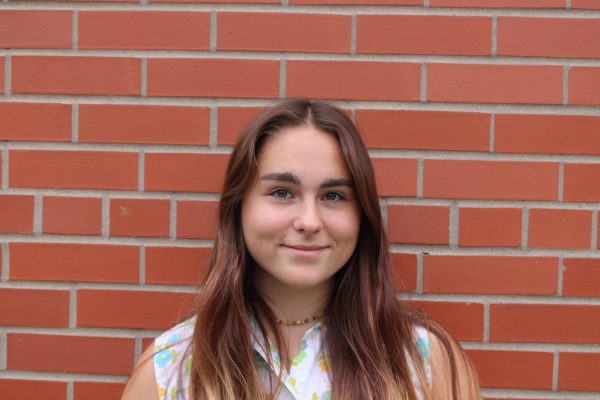Littered with litter
Waste strewn across parking lots
Sophomore Silas Cowell disposes a lunch tray May 16. Trash cans are available throughout the school and outside for students to use.
June 1, 2022
Lately at Park, trash has been scattered all across the student parking lot. McDonald’s breakfast bags make up the majority of the litter left by students, which makes sense considering many students eat their breakfast in their cars before school.
Oftentimes when garbage isn’t picked up, it ends up in various parts of nature, including streams. Especially with the recent severe thunderstorms, lots of that plastic and other waste can go into storm drains. According to AP environmental science teacher Pat Hartman, it can then end up in habitats and ecosystems where it could do some serious damage.
“(Trash) can end up getting washed away and end up in the sewer stormwater and ultimately could end up in Minnehaha Creek,” Hartman said. “We don’t want those plastics in the environment, because they’ll proliferate for a really long period of time.”
On the subject of nature, litter left in the parking lot can also cause student, teacher and resident safety concerns. Food waste, such as McDonalds breakfasts, can attract all sorts of animals that could be a threat to student and resident safety. Hartman said nearby animals could get used to having that source of food and return for more.
“Animals are eating stuff, and they’re habituated to that. In the news right now, there’s that bear wandering around St. Louis Park. It might be going after trash cans and that kind of thing. But if it’s finding food around, it’s like, ‘Well, this is easy,’” Hartman said. “There’s other animals that do that too. Certainly squirrels, crows, pigeons, other (animals) that would go after food like that.”
Along with the security issues and environmental repercussions, an abundance of litter does not make Park look very eco-friendly or tidy. For sophomore Zoie Okerman, the trash in the parking lot is not a pretty sight.
“It’s really sad and disgusting. I don’t like seeing it,” Okerman said.
Hartman said the example that is being set with littering will encourage others to continue the cycle of untidiness.
“If you are ever in a place and it’s clean, you take more pride in keeping that place clean. But if you go into a place, whether it’s a classroom, hallway, parking lot, street, and it’s dirty, then you have less pride,” Hartman said. “Maybe you don’t feel as bad if you spill something or leave some garbage behind, because there’s already garbage there. So who cares? I think there’s like a mentality piece with it, too.”
Not only does leaving garbage in the parking lots look bad, but it’s inconsiderate to those who inevitably have to pick it up, according to Hartman.
“It’s frustrating, because someone has to clean it up at some point,” Hartman said. “I don’t think that people always think about (how) someone has to clean it up.”
In a recent issue of the 6425 school newsletter, a small section about trash in the parking lot was included. The announcement was followed with no change to the conditions of the parking lot, and administration has seemingly given up. To Okerman, simply asking students to do better isn’t going to be enough, but an incentive might make more progress.
“Just telling students, ‘You should pick up your trash’ isn’t going to do anything. Maybe the school could do something where if you throw out your trash, you could win something or be recognized for helping and making an impact in our school and our environment,” Okerman said. “Because just telling kids nothing’s gonna change.”
There are many ways the students ourselves can help control this litter problem, with the most obvious one being bringing garbage inside and throwing it away. Okerman thinks people at Park should be mindful about their waste disposal.
“(Students) should be more aware of how they’re handling their trash after using it, and recycle as much as possible. Just don’t leave it on the floor, or the ground outside,” Okerman said.




